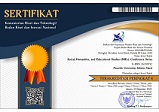Persepsi Guru terhadap Materi Mitigasi Perubahan Iklim yang Diaplikasikan melalui Pengintegrasian Visi II Literasi Sains dan Pendekatan STEM
Abstract
Climate change mitigation is a crucial subject that needs to be well understood. However, many elementary school students still lack adequate climate change mitigation skills. This study aims to explore teachers’ perceptions of climate change mitigation education for children by integrating the STEM approach and Vision II of Scientific Literacy. The background of this research is Indonesia's commitment to the Paris Agreement to combat climate change, despite the fact that the country remains one of the largest contributors to greenhouse gas emissions. Therefore, climate change mitigation education needs to be taught contextually through STEM and scientific literacy approaches. This research employed a qualitative method with data triangulation through questionnaires, semi-structured interviews, and document analysis. Thematic analysis was conducted using Braun & Clarke’s (2006) model. The findings indicate that teachers perceive terms such as greenhouse effect, greenhouse gases, and global warming as difficult for students to understand, thus hindering meaningful comprehension of climate change mitigation. Furthermore, there is a lack of instructional media that simplifies these concepts for easier student understanding. Learning materials, student worksheets (LKPD), and media that connect climate change mitigation to socio-scientific issues rooted in environmental and social contexts are also currently unavailable.
Mitigasi perubahan iklim merupakan materi yang penting untuk dipahami. Namun masih banyak siswa sekolah dasar yang memiliki kemampuan mitigasi perubahan iklim. Penelitian ini bertujuan untuk mengetahui persepsi guru terhadap pembelajaran mitigasi perubahan iklim pada anak dengan mengintegrasikan pendekatan STEM dan Visi II Literasi Sains. Latar belakang penelitian ini adalah komitmen Indonesia dalam Perjanjian Paris untuk mengatasi perubahan iklim, meskipun nyatanya Indonesia masih menjadi salah satu penyumbang emisi gas rumah kaca terbesar. Oleh karena itu, pembelajaran mitigasi perubahan iklim perlu diajarkan secara kontekstual melalui pendekatan STEM dan literasi sains. Metode penelitian menggunakan pendekatan kualitatif dengan triangulasi data melalui angket, wawancara semi-terstruktur, dan studi dokumentasi. Data dianalisis secara tematik berdasarkan model Braun & Clarke (2006). Hasil penelitian menunjukkan bahwa guru menganggap istilah-istilah seperti efek rumah kaca, gas rumah kaca, dan pemanasan global sulit dipahami siswa, sehingga menghambat pemahaman bermakna tentang mitigasi perubahan iklim. Selain itu, belum ada media pembelajaran yang menyederhanakan konsep tersebut agar mudah dipahami siswa. Pembelajaran, LKPD, dan media yang mengaitkan mitigasi perubahan iklim dengan isu sosiosaintifik berbasis lingkungan dan sosial juga belum tersedia.
Keywords
Full Text:
PDFReferences
Allgaier, J. (2019). Science and Environmental Communication on YouTube: Strategically Distorted Communications in Online Videos on Climate Change and Climate Engineering. Frontiers in Communication, 4(36). https://doi.org/10.3389/fcomm.2019.00036
Braun, V., & Clarke, V. (2006). Using thematic analysis in psychology. Qualitative Research in Psychology, 3(2), 77–101. https://doi.org/https://doi.org/10.1191/1478088706qp063oa
Broderick, N. (2023). Exploring different visions of scientific literacy in Irish primary science education: core issues and future directions. Irish Educational Studies, 1–21. https://doi.org/10.1080/03323315.2023.2230191
Cresswell, J. W. (2014). Research Design: Qualitative, Quantitative, and Mixed Methods Approaches (4th ed.). SAGE Pub. https://doi.org/10.5539/elt.v12n5p40
Dugger, W. E. (2010). Evolution of STEM in the United States. Knowledge in Technology Education, 1.
Duran-Becerra, Z., López-Vargas, R., Villamizar, A., & Gómez, C. (2020). Climate Change on YouTube: A Potential Platform for Youth Learning. Health Promotion Perspectives, 10(3). https://doi.org/https://doi.org/10.34172/hpp.2020.45
Hallinen, J. (2024). STEM Education Curriculum. Www.Britannica.Com. https://www.britannica.com/topic/STEM-education
Johnson, C. C. (2013). Conceptualizing Integrated STEM Education. School Sience & Mathematics, 113(8), 367–368. https://doi.org/https://doi.org/10.1111/ssm.12043
Jolly, A. (2016). STEM by Design Strategies and Activities for Grades 4-8. Routledge. https://doi.org/https://doi.org/10.4324/9781315679976
Jones, M., Geiger, V., Falloon, G., Fraser, S., Beswick, K., Holland-Twining, B., & Hatisaru, V. (2024). Learning contexts and visions for STEM in schools. International Journal of Science Education, 1–21. https://doi.org/10.1080/09500693.2024.2323032
Kohler, M., & Dietrich, D. (2021). YouTube Science Communication and The Challenge of Quality: A Content Analysis of Climate Change Videos. Frontiers in Communication, 6(581302). https://doi.org/https://doi.org/10.3389/fcomm.2021.581302
Laboy-Rush, D. (2011). Integrated STEM education through project-based learning. Learning.Com, 12(4), 1–12.
Lucas, G. (2005). Instructional module project based learning. The George Lucas Educational Foundation. https://www.lucasedresearch.org/
Murphy, S., MacDonald, A., Danaia, L., & Wang, C. (2019). An Analysis of Australian STEM Education Strategies. Policy Futures in Education, 17(2), 122–139. https://doi.org/10.1177/1478210318774190
Ng, S. B. (2019). Exploring STEM competences for the 21st century. In-Progress Reflection, 30, 1–53. https://unesdoc.unesco.org/ark:/48223/pf0000368485
Ojala, T., Bengtsson, A., Håg, A., & Kamala, A. (2022). Students’ Knowledge of Climate Change, Mitigation and Adaptation in the Context of Constructive Hope. Education Sciences (MDPI), 11(3). https://doi.org/10.3390/educsci11030103
Pramswari, A. Y., Djukri, & Kurniawati, E. (2022). Understanding of Teachers and Elementary Students on Climate Change Mitigation and Issues. Jurnal Pendidikan IPA Indonesia, 11(2), 224–232. https://doi.org/10.15294/jpii.v11i2.35475
Undang-Undang Republik Indonesia Nomor 31 Tahun 2009 tentang Meteorologi, Klimatologi, dan Geofisika, Pub. L. No. 31 (2009).
Ripple, W. J., Wolf, C., Gregg, J. W., Levin, K., Rockström, J., Newsome, T. M., Betts, M. G., Huq, S., Law, B. E., Kemp, L., Kalmus, P., & Lenton, T. M. (2020). World Scientists’ Warning of a Climate Emergency 2022. Bio Science, 70(1), 100. https://doi.org/https://doi.org/10.1093/biosci/biz152
Sarsale, J., Lopez, E. N., Alia, L., & Alejandro, B. (2024). STEM Education in ASEAN Countries: Practices and Way Forward. Science Education International, 35(4), 360–368. https://doi.org/10.33828/sei.v35.i4.7
Sutinah, C., Widodo, A., Muslim, & Syaodih, E. (2023). Dapatkah Siswa Sekolah Dasar Mengambil Keputusan terkait Perubahan iklim? Sebuah Penelitian Deskriptif. Jurnal Elementaria Edukasia, 6(2), 328–338. https://doi.org/10.31949/jee.v6i2.5401
Thomas, J. W. (2000). A Review of Research on Project-Based Learning. In A review of research on project-based learning.
United Nation. (2022). Climate Action: Education is key to addressing climate change. Www.Un.Org. https://www.un.org/en/climatechange/climate-solutions/education-key-addressing-climate-change
United Nations Children’s Fund. (2021). The Climate Crisis is a Child Rights Crisis: Introducing the Children’s Climate Risk Index.
Wan, Z. H., Jiang, Y., & Zhan, Y. (2021). STEM Education in Early Childhood: A Review of Empirical Studies. Early Education and Development, 32(7), 940–962. https://doi.org/10.1080/10409289.2020.1814986
Refbacks
- There are currently no refbacks.





